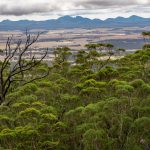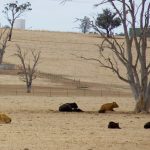 March 13, 2020 10:59 am
Published by Climate Extremes
March 13, 2020 10:59 am
Published by Climate Extremes
In this study, CLEX researchers and colleagues analysed the magnitude and sensitivity of vegetation responses to the Millennium Drought with satellite-derived information.
 March 13, 2020 9:49 am
Published by Climate Extremes
March 13, 2020 9:49 am
Published by Climate Extremes
A new study by CLEX researchers and colleagues shows that CMIP5 models as a group, when forced by observed sea surface temperatures underestimate, these atmospheric feedbacks on average by 23%. This underestimate can be linked to the wrong location at which climate models simulate the most important tropical circulation, called the Walker circulation.
 March 11, 2020 12:45 pm
Published by Climate Extremes
March 11, 2020 12:45 pm
Published by Climate Extremes
When the “Beast from the East” brought cold temperatures and heavy snowfall to western Europe in February and March 2018, a lot of people were quick to link the extreme weather to a sudden stratospheric warming (SSW) that had recently occurred. CLEX researchers found there was a surprising lack of research on the relationship between SSWs and climate extremes in Europe using observations, so they sought to look at this in more detail to see if this link can really be made.
 March 11, 2020 10:47 am
Published by Climate Extremes
March 11, 2020 10:47 am
Published by Climate Extremes
This report responds to a request by the National Climate Science Advisory Committee (NCSAC) for input to its strategic discussions in the area of climate processes research. Specifically, it summarises the current state of climate processes research in Australia, identifies gaps, and provides options for moving the area forward into the next decade.
 March 10, 2020 11:08 am
Published by Climate Extremes
March 10, 2020 11:08 am
Published by Climate Extremes
In this study, CLEX researchers and colleagues tested the ability of 10 terrestrial biosphere models to reproduce observed sensitivity of ecosystem productivity to rainfall changes (rainfall exclusion/irrigation) at ten sites across the globe.
 March 10, 2020 10:24 am
Published by Climate Extremes
March 10, 2020 10:24 am
Published by Climate Extremes
This study looks at the average climate in the northern hemisphere with a simplified climate model. It considers the atmospheric effects of mountain ranges (Tibet, Rockies), contrasts between land and ocean surface, and ocean currents at the surface (such as the Gulf Stream) and their impact on winter climate.
 March 10, 2020 3:00 am
Published by Climate Extremes
March 10, 2020 3:00 am
Published by Climate Extremes
New international research has found a worrying change in the Indian Ocean’s surface temperatures that puts southeast Australia on course for increasingly hot and dry conditions.
 March 9, 2020 3:03 pm
Published by Climate Extremes
March 9, 2020 3:03 pm
Published by Climate Extremes
Using a simplified climate model, researchers forced the south polar winds to reverse arbitrarily and found that the final impact at the surface is indistinguishable from events where the winds reverse in response to natural phenomena.
 March 9, 2020 2:35 pm
Published by Climate Extremes
March 9, 2020 2:35 pm
Published by Climate Extremes
New research shows, contrary to expectation, the inter-annual variance in evapotranspiration is much smaller than for precipitation, runoff and soil storage. Accounting for hydrologic covariances explains why it is possible for variability in the principal sink (e.g., streamflow) to exceed variability in the source (precipitation).
 March 5, 2020 11:07 am
Published by Climate Extremes
March 5, 2020 11:07 am
Published by Climate Extremes
Drought can unfold on sub-seasonal to seasonal time scales, meaning weeks to months, posing a particular risk to the agricultural sector. This type of drought has recently been recognized and given the name “flash drought”.










